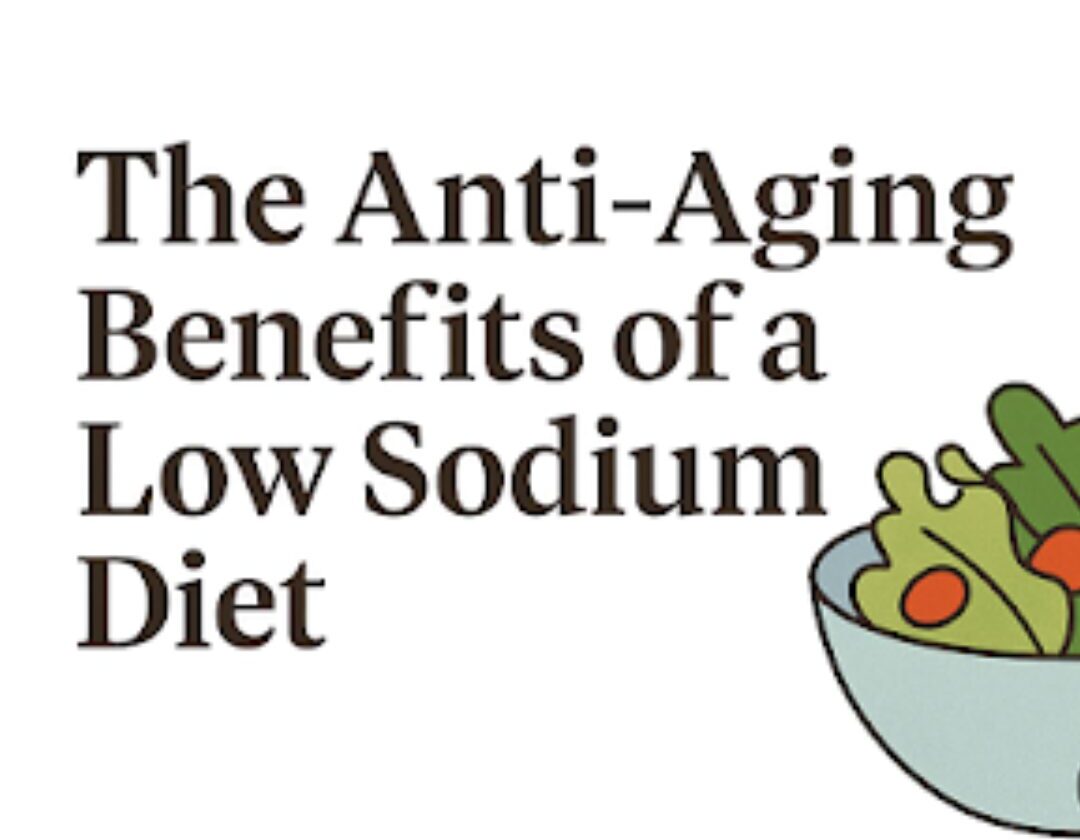Aging is a natural process, but lifestyle choices—especially diet—can significantly influence how we age. While we often associate anti-aging with skincare and supplements, what we eat plays a much deeper role in how our bodies and minds age over time. One dietary factor that has a profound impact but often gets overlooked
Excess sodium doesn’t just affect heart health; it contributes to inflammation, cognitive decline, skin aging, and bone loss—factors closely tied to premature aging. Here’s how cutting back on sodium can help you look and feel younger, inside and out.
1. Reduces Inflammation
Inflammation is a key driver of aging, often referred to as “inflammaging.” It accelerates the decline of tissues and organs, paving the way for chronic conditions like arthritis, Alzheimer’s, and cardiovascular disease.
Studies show that high sodium intake elevates levels of pro-inflammatory cytokines, such as interleukin-6 and tumor necrosis factor-alpha (TNF-α). Chronic low-grade inflammation can accelerate biological aging and make the body more susceptible to disease.
A low sodium diet reduces this inflammatory burden, helping the body maintain a healthier internal environment and slowing the visible and cellular signs of aging.
2. Preserves Skin Elasticity
Skin health is often the first place aging becomes visible. Excess sodium leads to water retention, causing puffiness and skin stretching. Over time, this fluid imbalance can break down collagen and elastin—proteins responsible for keeping skin firm and youthful.
Moreover, high sodium diets increase oxidative stress and inflammation, both of which damage skin cells and accelerate the appearance of wrinkles, sagging, and uneven skin tone. A low sodium diet helps maintain cellular hydration and minimizes oxidative damage, preserving skin elasticity and glow.
3. Supports Brain Health
Aging is often accompanied by a decline in cognitive function—but sodium may play a larger role than you think. Research suggests that high sodium levels may impair endothelial function and reduce blood flow to the brain, leading to memory issues and cognitive decline over time.
A 2018 study published in Nature Neuroscience found that high salt diets in mice led to reduced nitric oxide production, causing brain cell damage and memory deficits. On the flip side, lowering sodium intake helps preserve vascular function, supporting better oxygen and nutrient delivery to brain tissues.
The result? Sharper memory, better focus, and long-term protection against age-related cognitive diseases.
4. Protects Bone Health
Bones might not be top of mind when we think about aging, but bone loss is a major age-related concern—especially for women. Excess sodium increases calcium excretion through urine, depleting the body’s bone-building mineral and weakening bone density over time.
According to the National Osteoporosis Foundation, reducing sodium intake helps preserve calcium levels, lowering the risk of osteoporosis and fractures as we age. A low sodium diet supports stronger, more resilient bones, keeping you active and independent longer.
Takeaway: Small Changes, Big Impact
Reducing sodium isn’t just about protecting your heart—it’s a powerful, science-backed way to slow down the aging process across multiple systems in the body. From smoother skin and stronger bones to better brain function and reduced inflammation, the anti-aging benefits of a low sodium diet are extensive and profound.
Tips to Get Started:
- Choose no-salt-added or low sodium products.
- Cook more meals at home using herbs, citrus, and spices instead of salt.
- Read labels carefully—sodium hides in sauces, soups, deli meats, and snacks.
- Stay hydrated to support sodium balance and skin health.
For low sodium, heart-healthy, and diabetic-friendly recipes that are fully shoppable by store, visit recipeshop.net and take the guesswork out of eating well.
Your future self will thank you.
References
- Yi, B., Titze, J., Rykova, M. et al. Effects of dietary salt levels on inflammatory markers in humans. J Clin Invest. 2015.
- Proksch, E., Brandner, J. M., & Jensen, J. M. The skin: an indispensable barrier. Exp Dermatol. 2008.
- Faraco, G., Hochrainer, K., Segarra, S. G. et al. Dietary salt promotes cognitive impairment through tau phosphorylation. Nature Neuroscience. 2018.
- Kleinewietfeld, M., Manzel, A., Titze, J. et al. Sodium chloride drives autoimmune disease by the induction of pathogenic TH17 cells. Nature. 2013.
- Massey, L.K., & Whiting, S.J. Dietary salt, urinary calcium, and bone loss. J Bone Miner Res. 1996.

